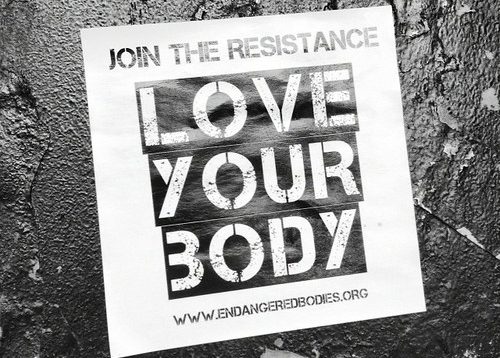The ‘Body Positivity’ Movement is Failing. Why?

This sign is part of a global initiative that hopes to instill self-love in women.
“You’re not fat, and you’re not skinny. You’re just…average.”
I can remember the exact inflection with which my friend said this to me in fifth grade. In a society that places all emphasis on body type, I felt like I was doomed to live a life of average-ness. Luckily, though, my teenage years were engulfed by the body positivity movement, right?
Not really. The body positivity movement, though popular, has failed to alter the way we view bodies in any genuine way. Here are three reasons why:
1. It’s led by the wrong people.
Somehow, a movement dedicated to the uplifting of fat (or otherwise unconventional) bodies has been dominated by…skinny people? While I can name only two fat activists— Lizzo and Sonya Renee Taylor—I can’t count the number of skinny “body positivity activists” I know personally.
And since the wrong people lead it, they emphasize the wrong thing. For example, in this Instagram post,  influencer Dana Mercer compares her pre-bloat body to her post-bloat body— both of which show off her skinny body type.
influencer Dana Mercer compares her pre-bloat body to her post-bloat body— both of which show off her skinny body type.
Mercer’s post is certainly not the only example. Lots of skinny people are posting flattering and “unflattering” pictures under the hashtag #PosedvsUnposed.
I recognize the good intentions of Mercer and others like her, but it doesn’t change the fact that they’re upholding the status quo that benefits them while seeming “woke” and “brave.”
To be clear, I don’t have a problem with skinny people posting on social media. But I do have a problem with skinny people speaking over fatter and unconventional people in a movement that isn’t theirs to lead. And they definitely don’t get to call it radical.
2. It doesn’t go beyond social media.
Plus, many body-positive “activists” don’t take their mindset beyond social media. They celebrate fat bodies on Instagram, but they point and laugh at the same thing they uplift at the beach, in schools, and every other public place. The reason that fat bodies do not feel comfortable in these spaces is because skinny people have made them feel uncomfortable through years of trauma and conditioning. A post on Instagram reminding us that “we’re all beautiful” doesn’t change that.
This is also because body positivity is seen as a “do-no-wrong” movement. As long as you’re being positive, you’re considered radical— even when parts of your “activism” harm the people you claim you’re fighting for.
If skinny people want to really take action, they have to first work on removing biases in the real world, and in real ways, just like privileged people must in every other movement that works to dismantle the status quo.
(Read more on “thin privilege” in this checklist by Sharon Ridgway.)
3. It still implies that our body shape correlates with our worth as humans.
The idea that “we are all beautiful” implies that beauty is, in some way, important enough to associate with our worth as human beings. Instead of focusing on intelligence, humor, personality and depth, the body positivity movement focuses on just that—our bodies. The body positivity movement says that our physical body is good and worthy, and therefore we are good and worthy. Really, our idea of our goodness and worth as human beings should be completely removed from what we look like.
Unlike body positivity, which still puts our physical body in charge of deciding our worth, “body neutrality communicates that our bodies are vehicles-that when treated with care- can become vibrant vessels for life to move through them,” says Maria Sorbara Mora, founder of Integrated Eating Dietetics-Nutrition PLLC.
Basically, if we treat our bodies as vessels for our minds and activities, we find that it doesn’t matter what we look like. It does not focus on the body being worthy, but instead on the self being worthy: an important distinction in a society that conditions us to believe that our bodies are what determines our worth.
Therefore, the body positivity movement is ineffective because it isn’t led by fat or otherwise unconventional people, doesn’t leave social media and still correlates bodies with worth. Hopefully, fat and unconventional will reclaim the movement for themselves.





